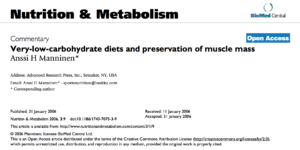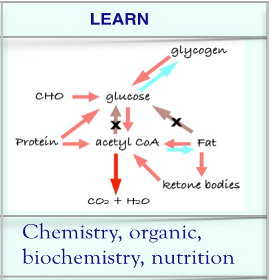The Paleo Diet for Athletes: The Ancient Nutritional Formula for Peak Athletic Performance. A breakthrough nutrition strategy for optimum athletic performance, weight loss and peak health based on the Stone Age diet humans were designed to eat. Paleo-style diets are all the rage as fitness enthusiasts
nutrition
Nutrition Research | Brooklyn, NY – Nutrition & Metabolism Society
Low-carbohydrate nutrition and metabolism
Eric C Westman, Richard D Feinman, John C Mavropoulos, Mary C Vernon, Jeff S Volek, James A Wortman, William S Yancy, and Stephen D Phinney
ABSTRACT
The persistence of an epidemic of obesity and type 2 diabetes sug- gests that new nutritional strategies are needed if the epidemic is to be overcome. A promising nutritional approach suggested by this thematic review is carbohydrate restriction. Recent studies show that, under conditions of carbohydrate restriction, fuel sources shift from glucose and fatty acids to fatty acids and ketones, and that ad libitum–fed carbohydrate-restricted diets lead to appetite reduction, weight loss, and improvement in surrogate markers of cardiovascular disease. Am J Clin Nutr 2007;86:276–84.
DOWNLOAD: Low-carbohydrate nutrition and metabolism Westman Feinman et al Am J Clin Nutr 2007
The case for low carbohydrate diets in diabetes management
Abstract
A low fat, high carbohydrate diet in combination with regular exercise is the traditional recommendation for treating diabetes. Compliance with these lifestyle modifications is less than satisfactory, however, and a high carbohydrate diet raises postprandial plasma glucose and insulin secretion, thereby increasing risk of CVD, hypertension, dyslipidemia, obesity and diabetes. Moreover, the current epidemic of diabetes and obesity has been, over the past three decades, accompanied by a significant decrease in fat consumption and an increase in carbohydrate consumption. This apparent failure of the traditional diet, from a public health point of view, indicates that alternative dietary approaches are needed. Because carbohydrate is the major secretagogue of insulin, some form of carbohydrate restriction is a prima facie candidate for dietary control of diabetes. Evidence from various randomized controlled trials in recent years has convinced us that such diets are safe and effective, at least in short-term. These data show low carbohydrate diets to be comparable or better than traditional low fat high carbohydrate diets for weight reduction, improvement in the dyslipidemia of diabetes and metabolic syndrome as well as control of blood pressure, postprandial glycemia and insulin secretion. Furthermore, the ability of low carbohydrate diets to reduce triglycerides and to increase HDL is of particular importance. Resistance to such strategies has been due, in part, to equating it with the popular Atkins diet. However, there are many variations and room for individual physician planning. Some form of low carbohydrate diet, in combination with exercise, is a viable option for patients with diabetes. However, the extreme reduction of carbohydrate of popular diets (<30 g/day) cannot be recommended for a diabetic population at this time without further study. On the other hand, the dire objections continually raised in the literature appear to have very little scientific basis. Whereas it is traditional to say that more work needs to be done, the same is true of the assumed standard low fat diets which have an ambiguous record at best. We see current trends in the national dietary recommendations as a positive sign and an appropriate move in the right direction.
DOWNLOAD: The case for low carbohydrate diets in diabetes management
Very-low-carbohydrate diets and preservation of muscle mass

DOWNLOAD: low carb and muscle mass preservation

